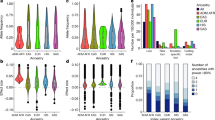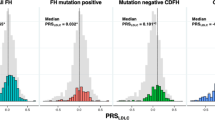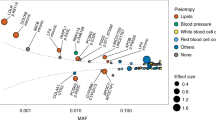Abstract
The apolipoprotein E single-nucleotide polymorphisms are among the potential candidate genes that may serve as modulators in susceptibility to essential hypertension. In an effort to clarify earlier inconclusive results, we performed a meta-analysis of population-based case–control genetic association studies. Random-effects methods were applied on summary data in order to combine the results of the individual studies. We identified in total 45 studies, including 13 940 hypertensive cases and 16 364 controls. The contrast of E4 carriers versus non-carriers yielded an overall odds ratio (OR) of 1.16 (95% confidence interval (CI): 1.02, 1.31), whereas the contrast of E4 allele versus the others in a subtotal of 6617 cases and 7330 controls, yielded an OR of 1.39 (95% CI: 1.12, 1.72). There was moderate evidence of publication bias in both contrasts, which was eliminated after excluding studies not in Hardy–Weinberg equilibrium. Subgroup analyses revealed that significant estimates arose from studies on Asian populations, as opposed to the Caucasian ones. Furthermore, no evidence of publication bias was demonstrated in the comparisons within this subgroup. Our results are consistent with recent meta-analyses but show that the association is weaker than that has been previously demonstrated. Further studies are needed in order to fully address questions about the etiological mechanism of the particular association, as well as to study the effect in populations of African descent.
This is a preview of subscription content, access via your institution
Access options
Subscribe to this journal
Receive 12 digital issues and online access to articles
$119.00 per year
only $9.92 per issue
Buy this article
- Purchase on Springer Link
- Instant access to full article PDF
Prices may be subject to local taxes which are calculated during checkout





Similar content being viewed by others
References
Ward R . Familial aggregation and genetic epidemiology of blood pressure. In: Laragh J, Brenner B, (eds). Hypertension-Pathophysiology, Diagnosis and Management. Raven Press: New York, 1990 pp 81.
Shore VG, Shore B . Heterogeneity of human plasma very low density lipoproteins. Separation of species differing in protein components. Biochemistry 1973; 12 (3): 502–507.
Siest G, Pillot T, Regis-Bailly A, Leininger-Muller B, Steinmetz J, Galteau MM et al. Apolipoprotein E: an important gene and protein to follow in laboratory medicine. Clin Chem 1995; 41 (8 Pt 1): 1068–1086.
Schaeffner ES, Kurth T, Curhan GC, Glynn RJ, Rexrode KM, Baigent C et al. Cholesterol and the risk of renal dysfunction in apparently healthy men. J Am Soc Nephrol 2003; 14 (8): 2084–2091.
Zak I, Niemiec P, Balcerzyk A, Krauze J . Combined ‘pro-atherosclerotic’ variants of the ACE and APOE genes increase the risk of the coronary artery disease associated with the presence of cigarette smoking. Acta Cardiol 2008; 63 (6): 741–747.
Pan Z, Trikalinos TA, Kavvoura FK, Lau J, Ioannidis JP . Local literature bias in genetic epidemiology: an empirical evaluation of the Chinese literature. PLoS Med 2005; 2 (12): e334.
Stroup DF, Berlin JA, Morton SC, Olkin I, Williamson GD, Rennie D et al. Meta-analysis of observational studies in epidemiology: a proposal for reporting. Meta-analysis of Observational Studies in Epidemiology (MOOSE) group. JAMA 2000; 283 (15): 2008–2012.
Bagos PG . A unification of multivariate methods for meta-analysis of genetic association studies. Stat Appl Genet Mol Biol 2008; 7 (1): Article31.
DerSimonian R, Laird N . Meta-analysis in clinical trials. Control Clin Trials 1986; 7 (3): 177–188.
Higgins JP, Thompson SG, Deeks JJ, Altman DG . Measuring inconsistency in meta-analyses. BMJ 2003; 327 (7414): 557–560.
Thompson SG, Sharp SJ . Explaining heterogeneity in meta-analysis: a comparison of methods. Stat Med 1999; 18 (20): 2693–2708.
Begg CB, Mazumdar M . Operating characteristics of a rank correlation test for publication bias. Biometrics 1994; 50 (4): 1088–1101.
Egger M, Davey Smith G, Schneider M, Minder C . Bias in meta-analysis detected by a simple, graphical test. BMJ 1997; 315 (7109): 629–634.
Trikalinos TA, Salanti G, Khoury MJ, Ioannidis JP . Impact of violations and deviations in Hardy-Weinberg equilibrium on postulated gene-disease associations. Am J Epidemiol 2006; 163 (4): 300–309.
Guo SW, Thompson EA . Performing the exact test of Hardy-Weinberg proportion for multiple alleles. Biometrics 1992; 48 (2): 361–372.
Lau J, Schmid CH, Chalmers TC . Cumulative meta-analysis of clinical trials builds evidence for exemplary medical care. J Clin Epidemiol 1995; 48 (1): 45–57 discussion 59-60.
Ioannidis JP, Trikalinos TA . Early extreme contradictory estimates may appear in published research: the Proteus phenomenon in molecular genetics research and randomized trials. J Clin Epidemiol 2005; 58 (6): 543–549.
Bagos PG, Nikolopoulos GK . Generalized least squares for assessing trends in cumulative meta-analysis with applications in genetic epidemiology. J Clin Epidemiol 2009; 62 (10): 1037–1044.
Terry JG, Howard G, Mercuri M, Bond MG, Crouse JR . Apolipoprotein E polymorphism is associated with segment-specific extracranial carotid artery intima-media thickening. Stroke 1996; 27 (10): 1755–1759.
Djousse L, Myers RH, Province MA, Hunt SC, Eckfeldt JH, Evans G et al. Influence of apolipoprotein E, smoking, and alcohol intake on carotid atherosclerosis: National Heart, Lung, and Blood Institute Family Heart Study. Stroke 2002; 33 (5): 1357–1361.
Sachdev PS, Parslow R, Wen W, Anstey KJ, Easteal S . Sex differences in the causes and consequences of white matter hyperintensities. Neurobiol Aging 2009; 30 (6): 946–956.
Fuzikawa AK, Peixoto SV, Taufer M, Moriguchi EH, Lima-Costa MF . Association of ApoE polymorphisms with prevalent hypertension in 1406 older adults: the Bambui Health Aging Study (BHAS). Braz J Med Biol Res 2008; 41 (2): 89–94.
Resnick HE, Rodriguez B, Havlik R, Ferrucci L, Foley D, Curb JD et al. Apo E genotype, diabetes, and peripheral arterial disease in older men: the Honolulu Asia-aging study. Genet Epidemiol 2000; 19 (1): 52–63.
Profenno LA, Faraone SV . Diabetes and overweight associate with non-APOE4 genotype in an Alzheimer’s disease population. Am J Med Genet B Neuropsychiatr Genet 2008; 147B (6): 822–829.
Carmelli D, Swan GE, Reed T, Miller B, Wolf PA, Jarvik GP et al. Midlife cardiovascular risk factors, ApoE, and cognitive decline in elderly male twins. Neurology 1998; 50 (6): 1580–1585.
Bennouar N, Allami A, Laraqui A, Azeddoug H, El-Kadiri N, Benkouka F et al. [Apolipoprotein E and angiotensin-converting enzyme gene polymorphisms as risk factors of coronary disease]. Ann Biol Clin 2004; 62 (3): 295–304.
Carmo MM, Lima FL, Rodrigues MO, Albergaria I, Fonseca A . Influence of the APOE genotypes in some atherosclerotic risk factors. Acta Med Port 2008; 21 (5): 433–440.
Isbir T, Yilmaz H, Bihorac A, Akoglu E . Mild-to-moderate hypertension and apolipoprotein E gene polymorphism. Am J Hypertens 1997; 10 (7 Part 1): 827–828.
Corbo RM, Vilardo T, Ruggeri M, Gemma AT, Scacchi R . Apolipoprotein E genotype and plasma levels in coronary artery disease. A case-control study in the Italian population. Clin Biochem 1999; 32 (3): 217–222.
Yilmaz H, Isbir T, Agachan B, Aydin M . Is epsilon4 allele of apolipoprotein E associated with more severe end-organ damage in essential hypertension? Cell Biochem Funct 2001; 19 (3): 191–195.
Li X, Du Y, Huang X . Association of apolipoprotein E gene polymorphism with essential hypertension and its complications. Clin Exp Med 2003; 2 (4): 175–179.
Niu W, Guo X, Su Y, Qiu C . Apolipoprotein E and low-density lipoprotein receptor gene polymorphisms in dyslipidemias-associated essential hypertension. J Hum Hypertens 2007; 21 (4): 337–339.
Dembinska-Kiec A, Kawecka-Jaszcz K, Kwasniak M, Guevara I, Pankiewicz J, Malczewska-Malec M et al. Apo E isoforms, insulin output and plasma lipid levels in essential hypertension. Eur J Clin Invest 1998; 28 (2): 95–99.
Eto M, Watanabe K, Chonan N, Ishii K . Familial hypercholesterolemia and apolipoprotein E4. Atherosclerosis 1988; 72 (2-3): 123–128.
Niu W, Qi Y, Qian Y, Gao P, Zhu D . The relationship between apolipoprotein E epsilon2/epsilon3/epsilon4 polymorphisms and hypertension: a meta-analysis of six studies comprising 1812 cases and 1762 controls. Hypertens Res 2009; 32 (12): 1060–1066.
Niu WQ, Qi Y . Meta-based evidence for apolipoprotein E varepsilon2/varepsilon3/varepsilon4 polymorphism in association with hypertension among Chinese. J Hum Hypertens 2011; 25 (12): 725–731.
Conn VS, Valentine JC, Cooper HM, Rantz MJ . Grey literature in meta-analyses. Nurs Res 2003; 52 (4): 256–261.
Young JH, Chang YP, Kim JD, Chretien JP, Klag MJ, Levine MA et al. Differential susceptibility to hypertension is due to selection during the out-of-Africa expansion. PLoS Genet 2005; 1 (6): e82.
Karvonen J, Kauma H, Kervinen K, Ukkola O, Rantala M, Paivansalo M et al. Apolipoprotein E polymorphism affects carotid artery atherosclerosis in smoking hypertensive men. J Hypertens 2002; 20 (12): 2371–2378.
Kalmijn S, Feskens EJ, Launer LJ, Kromhout D . Cerebrovascular disease, the apolipoprotein e4 allele, and cognitive decline in a community-based study of elderly men. Stroke 1996; 27 (12): 2230–2235.
Schmidt R, Schmidt H, Fazekas F, Schumacher M, Niederkorn K, Kapeller P et al. Apolipoprotein E polymorphism and silent microangiopathy-related cerebral damage. Results of the Austrian Stroke Prevention Study. Stroke 1997; 28 (5): 951–956.
Kessler C, Spitzer C, Stauske D, Mende S, Stadlmuller J, Walther R et al. The apolipoprotein E and beta-fibrinogen G/A-455 gene polymorphisms are associated with ischemic stroke involving large-vessel disease. Arterioscler Thromb Vasc Biol 1997; 17 (11): 2880–2884.
Kimura H, Suzuki Y, Gejyo F, Karasawa R, Miyazaki R, Suzuki S et al. Apolipoprotein E4 reduces risk of diabetic nephropathy in patients with NIDDM. Am J Kidney Dis 1998; 31 (4): 666–673.
Niemi M, Kervinen K, Rantala A, Kauma H, Paivansalo M, Savolainen MJ et al. The role of apolipoprotein E and glucose intolerance in gallstone disease in middle aged subjects. Gut 1999; 44 (4): 557–562.
Dzimiri N, Meyer BF, Hussain SS, Basco C, Afrane B, Halees Z . Relevance of apolipoprotein E polymorphism for coronary artery disease in the Saudi population. Arch Pathol Lab Med 1999; 123 (12): 1241–1245.
Meigs JB, Ordovas JM, Cupples LA, Singer DE, Nathan DM, Schaefer EJ et al. Apolipoprotein E isoform polymorphisms are not associated with insulin resistance: the Framingham Offspring Study. Diabetes Care 2000; 23 (5): 669–674.
Gonzalez-Amieva A, Lopez-Miranda J, Fuentes F, Castro P, Marin C, Lopez-Granados A et al. Genetic variations of the apolipoprotein E gene determine the plasma triglyceride levels after heart transplantation. J Heart Lung Transplant 2000; 19 (8): 765–770.
Guz G, Nurhan Ozdemir F, Sezer S, Isiklar I, Arat Z, Turan M et al. Effect of apolipoprotein E polymorphism on serum lipid, lipoproteins, and atherosclerosis in hemodialysis patients. Am J Kidney Dis 2000; 36 (4): 826–836.
Imazu M, Yamamoto H, Toyofuku M, Watanabe T, Okubo M, Egusa G et al. Association of apolipoprotein E phenotype with hypertension in Japanese-Americans: data from the Hawaii-Los Angeles-Hiroshima Study. Hypertens Res 2001; 24 (5): 523–529.
Bednarska-Makaruk M, Broda G, Kurjata P, Rodo M, Roszczynko M, Rywik S et al. Apolipoprotein E genotype, lipid levels and coronary heart disease in a Polish population group. Eur J Epidemiol 2001; 17 (8): 789–792.
Schwanke CH, da Cruz IB, Leal NF, Scheibe R, Moriguchi Y, Moriguchi EH . Analysis of the association between apolipoprotein E polymorphism and cardiovascular risk factors in an elderly population with longevity. Arq Bras Cardiol 2002; 78 (6): 561–579.
Katsuya T, Baba S, Ishikawa K, Mannami T, Fu Y, Inamoto N et al. Epsilon 4 allele of apolipoprotein E gene associates with lower blood pressure in young Japanese subjects: the Suita Study. J Hypertens 2002; 20 (10): 2017–2021.
Mozas P, Castillo S, Reyes G, Tejedor D, Civeira F, Garcia-Alvarez I et al. Apolipoprotein E genotype is not associated with cardiovascular disease in heterozygous subjects with familial hypercholesterolemia. Am Heart J 2003; 145 (6): 999–1005.
Qiu C, Winblad B, Fastbom J, Fratiglioni L . Combined effects of APOE genotype, blood pressure, and antihypertensive drug use on incident AD. Neurology 2003; 61 (5): 655–660.
Pezzini A, Grassi M, Del Zotto E, Bazzoli E, Archetti S, Assanelli D et al. Synergistic effect of apolipoprotein E polymorphisms and cigarette smoking on risk of ischemic stroke in young adults. Stroke 2004; 35 (2): 438–442.
de Leeuw FE, Richard F, de Groot JC, van Duijn CM, Hofman A, Van Gijn J et al. Interaction between hypertension, apoE, and cerebral white matter lesions. Stroke 2004; 35 (5): 1057–1060.
Ranjith N, Pegoraro RJ, Rom L, Rajput MC, Naidoo DP . Lp(a) and apoE polymorphisms in young South African Indians with myocardial infarction. Cardiovasc J S Afr 2004; 15 (3): 111–117.
Kang JH, Logroscino G, De Vivo I, Hunter D, Grodstein F . Apolipoprotein E cardiovascular disease and cognitive function in aging women. Neurobiol Aging 2005; 26 (4): 475–484.
Um JY, Hwang CY, Hwang WJ, Kang SD, Do KR, Cho JJ et al. Association between iris constitution and apolipoprotein e gene polymorphism in hypertensives. J Altern Complement Med 2004; 10 (6): 1101–1105.
Bhavani AB, Sastry KB, Reddy NK, Padma T . Lipid profile and apolipoprotein E polymorphism in essential hypertension. Indian Heart J 2005; 57 (2): 151–157.
Rowan E, Morris CM, Stephens S, Ballard C, Dickinson H, Rao H et al. Impact of hypertension and apolipoprotein E4 on poststroke cognition in subjects >75 years of age. Stroke 2005; 369: 1864–1868.
Pitsavos C, Choumerianou DM, Skoumas J, Maumus S, Stefanadis C, Dedoussis GV et al. Apolipoprotein E polymorphism is not associated with lipid levels and coronary artery disease in Greek patients with familial hypercholesterolaemia. Clin Exp Med 2005; 5 (4): 196–201.
Baum L, Lam LC, Kwok T, Lee J, Chiu HF, Mok VC et al. Apolipoprotein E epsilon4 allele is associated with vascular dementia. Dement Geriatr Cogn Disord 2006; 22 (4): 301–305.
Formiga F, Alia P, Navarro MA, Pujol R . Apolipoprotein e genotypes in nonagenarians. J Am Geriatr Soc 2006; 54 (9): 1471–1473.
Wohlin M, Sundstrom J, Lannfelt L, Axelsson T, Syvanen AC, Andren B et al. Apolipoprotein E epsilon4 genotype is independently associated with increased intima-media thickness in a recessive pattern. Lipids 2007; 42 (5): 451–456.
Wang B, Zhao H, Zhou L, Dai X, Wang D, Cao J et al. Association of genetic variation in apolipoprotein E and low density lipoprotein receptor with ischemic stroke in Northern Han Chinese. J Neurol Sci 2009; 276 (1-2): 118–122.
Ruixing Y, Jinzhen W, Weixiong L, Yuming C, Dezhai Y, Shangling P . The environmental and genetic evidence for the association of hyperlipidemia and hypertension. J Hypertens 2009; 27 (2): 251–258.
Acknowledgements
We would like to thank the two anonymous reviewers whose comments helped in improving the quality of the manuscript.
Author information
Authors and Affiliations
Corresponding author
Ethics declarations
Competing interests
The authors declare no conflict of interest.
Rights and permissions
About this article
Cite this article
Stoumpos, S., Hamodrakas, S., Anthopoulos, P. et al. The association between apolipoprotein E gene polymorphisms and essential hypertension: a meta-analysis of 45 studies including 13 940 cases and 16 364 controls. J Hum Hypertens 27, 245–255 (2013). https://doi.org/10.1038/jhh.2012.37
Received:
Revised:
Accepted:
Published:
Issue Date:
DOI: https://doi.org/10.1038/jhh.2012.37



